Crapshoot: The game that put the final nail in the Zork series' coffin
We're rerunning Richard Cobbett's classic Crapshoot column, in which he rolled the dice and took a chance on obscure games—both good and bad.
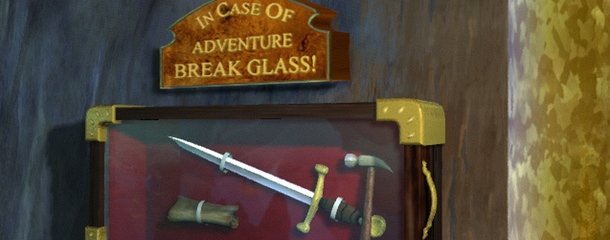
From 2010 to 2014 Richard Cobbett wrote Crapshoot, a column about bringing random obscure games back into the light. This week, prepare to enter a world of adventure where life is cheap, only cheaters prosper, and a few familiar faces are looking forward to saying hello.
When I say that I hate the Myst series, I'm not being entirely fair. Oh, they are dreadful, don't get me wrong—the most fun I ever had with them was imagining that their backstories were a lie, and really the inhabitants of these pretty-but-boring worlds died out because some idiot locked their only toilet with a stupid puzzle that required them to demonstrate knowledge of local celestial movements before they got to take a bowel one. If you put me on a desert island with a computer and the entire series, I would snap one of the discs in half and use it to slice my own wrists open.
Really though, what I hate about them is what they did to adventures—convince people that no, we didn't want characters or plotting (and please, spare me the links to a wiki about the intricate backstory of the Stoneship Age) or puzzles with an actual reason to get in our way. Now, if you could render a vaguely pretty world and put some unmarked levers and dials on it, your job was done. In the entire history of Myst-type games, I can list maybe five I genuinely consider worth having given a chance.
So when I now say that Zork: Grand Inquisitor was a wonderful surprise, I really mean it.
Chances are you've heard the name Zork before. The series started as a set of text-adventures played on MIT computers back in 1977, before being retooled and released as the first games from interactive fiction legends Infocom. There were three games in the main series back then, along with a few spin-offs/semi-spinoffs like Enchanter and Wishbringer, and the adventure/RPG hybrid Beyond Zork. The series was revived in 1993 with the frankly pretty dreadful Return to Zork (whose main contribution to the world was letting adventure fans greet each other with a cry of "Want some rye? Course ya do!"), the dark and brooding Zork: Nemesis, and finally Grand Inquisitor, whose low sales put an end to not only the games, but a planned TV show.
But don't worry about most of that. Here's your for-gods-sake-don't-cut-out-and-keep guide to everything you need to know about the Zork universe before you play Grand Inquisitor.
- 1. It mostly takes place in a magical underground world.
- 2. It all started outside a white house.
- 3. Don't go into the dark, you are likely be eaten by a grue.
Or, in rap form...
Keep up to date with the most important stories and the best deals, as picked by the PC Gamer team.
Incidentally, while we're in list-mode, I should add a few technical warnings for Zork: GI that don't seem to have been fixed in the GOG version. It mostly works fine on Windows 7, except...
- 1. The spin-around mouse controls can be unplayably fast on modern systems.
- 2. This is Annoying.
- 3. You can try slowing it down from the Settings screen.
- 4. But it won't work.
- 5. So you may end up having to use the arrow keys to turn.
- 6. You should probably blame Communism.
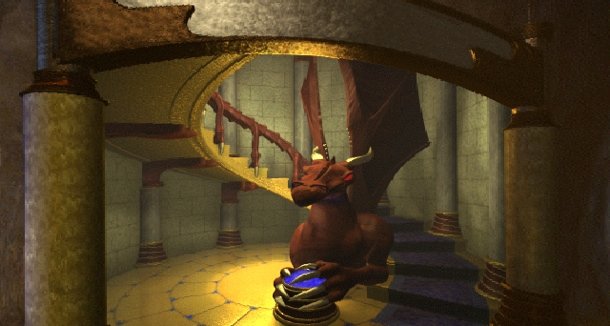
At first glance, Grand Inquisitor looks like many, many other Myst games. Rendered graphics, spinny-turny exploration, not many characters, lots of puzzles. And for the most part, that's exactly what it is. It's much funnier than most, largely because you're constantly accompanied by a wise-cracking sidekick (the current Dungeon Master, Dalboz, trapped in a lantern you carry and voiced by Michael "Hey, It's That Guy" McKean), and everything you encounter has its tongue surgically implanted into its cheek.
The closest your character gets to a background is that you're a perpetually mute travelling vacuum salesman (and even this, you only learn via death messages), who Dalboz nicknames Ageless Faceless Gender-Neutral, Culturally Ambiguous Adventure Person: AAFGNCAAP for short.
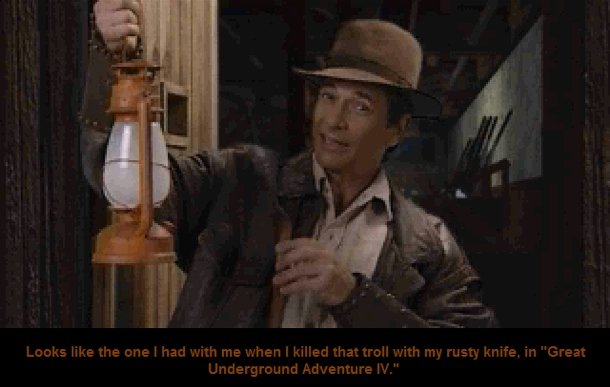
Of the world you enter—literally one second before curfew—little really matters, save that it's under the heel of a tyrant called the Grand Inquisitor (Erick "Hey, It's That Guy" Avari) who's banned all magic, sealed up the underground, and really loves giving speeches. "Shun magic, and shun the appearance of magic!" he demands in the intro, shortly followed by clarifying the current political landscape. "Never forget who is the boss of you!" he cries, fists pumping. "ME! I AM THE BOSS OF YOU!"
In preparation for this week's column, I conducted a quick science experiment. According to our specially constructed Ham-O-Meter, a single word from the Grand Inquisitor is the equivalent of a whole gammon steak, plus pineapple. To properly represent an entire speech, such as one near the end of the game, you would need to construct a gigantic chessboard, place a single pig on the first square, then two on the second, four on the third, eight on the next and so on and so forth until the entire board was complete. Slaughtering all 18,446,744,073,709,551,615 of those pigs would give you a reasonable idea what we're dealing with here, and also the single greatest bacon sandwich ever . Suck it, Epic Meal Time.
There's honestly not a lot more plot than that. The quest is shamelessly 'get the three things to save the world', and that world is little but a life-support system for the puzzles. There are a few running themes, including the misadventures of a TV hero called Antharia Jack, played by Dirk "Hey, It's That Guy" Benedict, the Grand Inquisitor's plans to totemise ("A Very Bad Thing," the game explains) the world's magical creatures, and a lost scion called Lucy Flathead, played by Amy "Is Also In It" Jacobson. Without all this stuff, Zork: Grand Inquisitor wouldn't be anything like as fun, but the story isn't the reason it's worth jumping in and playing around in its world.
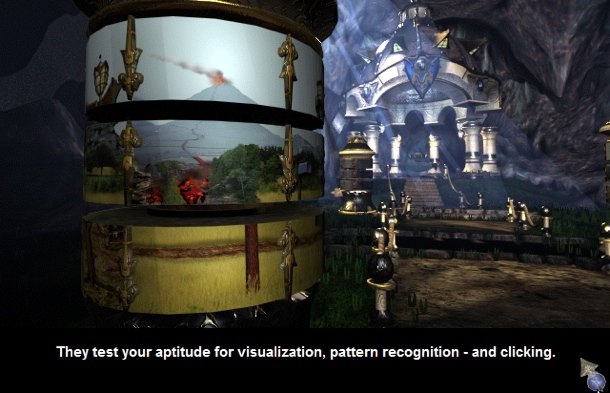
Grand Inquisitor is, to the point that there's no real competition, the most self-aware adventure game I have ever played. Unlike many comedy games though, it doesn't simply point out the genre's usual rules and cliches, but goes out of its way to play with them. Many puzzles are built around cheating for instance—impossible unless you change the rules. One early example is a dam which you need to blow up by shutting all of its doors, but the default configuration won't ever let you do that. You need to bring along the 'REZROV' door-opening spell to force one of the others open first. An easier example later on involves winning a game of Strip Grue, Fire, Water (no prizes for guessing what it's based on), which isn't exactly difficult, since you're in the body of a psychic at the time. My favourite of all though—the moment at which you're officially not allowed to dislike Zork: Grand Inquisitor or anything contained within—is when you're given a complicated looking chessboard type device housing one of the items you need to save the world, and the solution is to smash the f**king thing open with a rock.
I have played many, many adventure games. I have played good ones, and I have played bad ones, and I have played ones so bad, even Hopkins FBI dare not get close in case the smell rubs off on it. There are no words for how satisfying that puzzle was to 'solve'. I don't smoke, but I need a cigarette.
Aaaaaaaaaaaaaaaaaaah. That's good puzzle.
The ones that don't revolve around cheating are harder, but just as satisfying. Almost all revolving around lateral thinking, and picking and prodding at the world's rules. The "In Case Of Adventure, Break Glass" puzzle from the header image is a great example... so let's see it again!
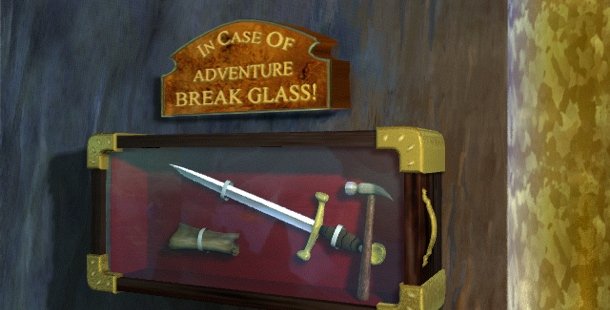
See the problem? That's right. The hammer is inside the case. How do you get it out? Simple. You just open the case and take it. You can't just take the sword and scroll though, because that's Not How This Works. You have to close the case again and dutifully smash the glass as instructed.
If that seems spectacularly anal—it is! But don't worry. You get your revenge soon enough, when you use a spell that makes purple things turn invisible to turn an Infinite Corridor into a Finite one.
The one downside of this kind of puzzle is that it's often not clear whether or not you actually have all the pieces you need, or what you're likely to get in the future. The world isn't huge, but even with teleporters, you're going to be retreading a lot of the same ground while working out what's next on the hit list. A few one-time trips out of the Underground add some extra variety, but tend to be incredibly short—a handful of new, teeny-tiny locations you only visit once, with little to actually do while you're there.
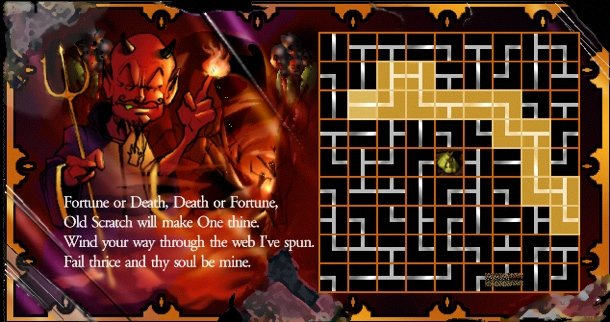
Chipping your way through the Underground is incredibly satisfying though. It's all effectively a single puzzle box, not desperately long or difficult to solve, but ever unfolding as you gain access to a new location, receive a spell that makes a previous dead-end suddenly click, and with a sense of fun and whimsy that makes what would otherwise be screamingly annoying filler puzzles (like Dalboz needing you to painstakingly make a mug of hot chocolate so that the smell can remind him of an important spell) seem at least more interesting.
All that said, the "save early, save often" rule is in full effect. You can't get into an unwinnable situation in Grand Inquisitor, but you sure as hell can die—and those deaths often come without any real warning. It's worth it for the funny death messages (and replaying to find any that you missed) but any joke falls flat if you lose a few hours progress to the belief that Myst-style games are all safe as incredibly dull houses. Here, everything about that thinking is wrong.

While Grand Inquisitor's sales were never officially released, I choose to believe that it sold 17 copies to gamers and one to a squirrel named Julian. At the very least, it underperformed, and at worst, it bombed. Instead of being the first part of a planned "Magic Trilogy", it banged the nails into the series' coffin. Short of an iOS re-release, since everything's getting those at the moment, we probably shouldn't get our hopes up.
Besides, these days it'd probably end up as a squad-based shooter or something.

